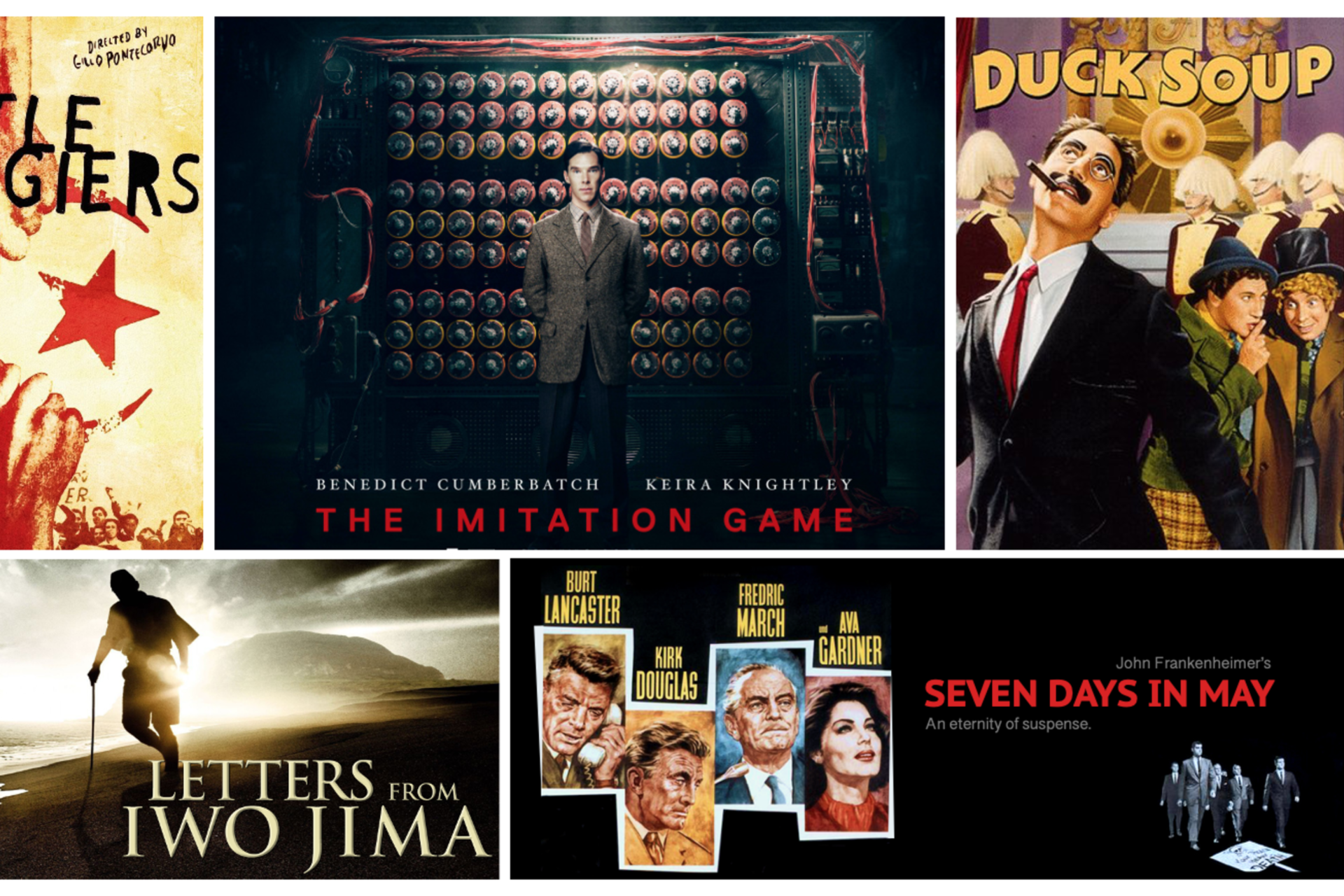Ten More Foreign-Policy Movies Worth Watching
Each Friday this summer, we suggest foreign-policy-themed movies worth watching. For our final week: films that we haven’t yet recommended and think we should.

By experts and staff
- Published
Experts
![]() By James M. LindsayMary and David Boies Distinguished Senior Fellow in U.S. Foreign Policy
By James M. LindsayMary and David Boies Distinguished Senior Fellow in U.S. Foreign Policy
By
- Margaret GachResearch Associate, U.S. Foreign Policy
All good things come to an end. For the past eleven weeks we have been offering up foreign-policy-themed movie recommendations each Friday. But with summer coming to a close and Election Day less than two months away, it’s time to return to discussing foreign policy and the campaign. For our final post in this series we decided to each recommend five films that for one reason or another didn’t make any of our previous lists.
Because we get to set the rules, we decided to abandon some of the guidelines we’ve been following all summer. Films in languages other than English are eligible for today’s post, as are films that aren’t entirely grounded in reality.
Here are Margaret’s picks:
Arrival (2016). When alien ships land in China, Russia, the United States, and nine other locations across the world, the U.S. military recruits Louise Banks to communicate with their extraterrestrial passengers. World governments initially cooperate to unlock the purpose of the aliens’ visit. But as frustration and uncertainty grows, the tenuous international collaboration risks turning into full-blown conflict. Based on sci-fi author Ted Chiang’s riveting novella Story of Your Life, the film explores the intricacies of language and game theory in international relations. Starring Amy Adams and Jeremy Renner, Arrival is reflective and unpredictable. It won one Oscar and was nominated for seven others, including Best Picture and Best Director for Denis Villeneuve. You can watch Arrival on Amazon Prime, Google Play, or YouTube.
Da 5 Bloods (2020). Director Spike Lee’s Da 5 Bloods is a powerful look at the experiences of Black U.S. soldiers in the Vietnam War. Four veterans reunite in Vietnam to find the body of their squad leader (the fifth “Blood” of the title) and the gold bars they buried five decades earlier. Amid a violent and funny caper movie about retrieving lost treasure, Da 5 Bloods also explores postwar trauma and the legacy of colonialism and the “American War” in Vietnam. Through flashbacks and archival footage, Lee captures the emotional conflict of Black soldiers—who made up around 23 percent of U.S. forces in Vietnam—fighting for democracy abroad while the civil rights movement escalated back home. The film is led by a gripping performance from Delroy Lindo and features Chadwick Boseman, in one of his last roles, as the squad’s bold leader, Stormin’ Norman. You can stream Da 5 Bloods on Netflix.
Duck Soup (1933). When a wealthy patroness installs her friend as dictator of the small, bankrupt country of Freedonia, the bellicose Sylvania looks to capitalize on its neighbor’s weakness. The two tiny countries soon find themselves teetering on the brink of war while their leaders seem equipped only to fan the flames. Duck Soup clocks in at just seventy minutes. But the Marx Brothers’ frenetic slapstick is packed with lampoons of politics, war, diplomacy, and jingoism. Duck Soup was not a commercial success at the box office; it’s acclaim came later. The American Film Institute ranked it the fifth funniest and sixtieth greatest American film of all time. You can watch Duck Soup on Amazon Prime, Google Play, or YouTube.
The African Queen (1951). Humphrey Bogart and Katharine Hepburn helm this World War I adventure. After colonial troops attack her village in German East Africa, uptight British missionary Rose Sayer is forced to flee with the gin-swilling captain of the The African Queen, Charlie Allnut. She convinces the reluctant Canadian to venture down the dangerous Ulanga River to destroy a German gunboat and aid the Allies. Exciting action and, of course, romance follow, buoyed by Bogart and Hepburn’s natural chemistry and comedic timing. The film was shot largely in Uganda and the then-Belgian Congo. Contaminated water led to widespread cases of dysentery among the cast and crew—except for Bogart and director John Huston, who primarily drank whiskey on set. Bogart won his only Oscar for his role as Allnut. The American Film Institute ranked The African Queen the sixty-fifth greatest American film of all time. You can watch it on Amazon Prime, Google Play, or YouTube.
The Imitation Game (2014). Alan Turing’s work in deciphering Nazi Germany’s Enigma machine allowed the Allies to preempt German U-boat attacks and helped clear the way for the invasion of Normandy. Based on Andrew Hodges’s biography Alan Turing: The Enigma, The Imitation Game follows Turing’s work at Bletchley Park and his struggles as a gay man when homosexuality was a criminal offense in Britain. Now credited as one of the fathers of modern computing, Turing was pardoned by the British government in 2013, six decades after his conviction for “gross indecency” and apparent suicide. Benedict Cumberbatch received an Oscar nod for his role as the mercurial genius, as did Keira Knightley for her part as Turing’s closest confidante and colleague. The Imitation Game was nominated for five other Oscars, including Best Director for Morten Tyldum and Best Picture, and won one. You can watch The Imitation Game on Amazon Prime, Google Play, or YouTube.
Here are Jim’s picks:
Jojo Rabbit (2019). Ten-year-old Johannes Betzler has an unusual imaginary friend: Adolf Hitler. The make-believe Adolf advises Jojo as he tries to fit in with his peers in the Hitler Youth. Things become complicated when Jojo discovers his mother is harboring a Jewish girl in their house. Directing and playing a clownish Adolf Hitler, Taika Waititi satirizes the Nazis while examining the horrors of World War II through the eyes of a German child. Waititi adapted the screenplay from Christine Leunens’s 2004 novel Caging Skies (but added the imaginary Hitler himself). Roman Griffin Davis stars as Jojo, and Scarlett Johansson received an Oscar nod for her role as his mother. Jojo Rabbit was nominated for four other Oscars, including Best Picture, and won one. You can find it on Amazon Prime, HBO Max, or Google Play.
Letters from Iwo Jima (2006). As both director and star, Clint Eastwood is no stranger to films about American wars. But for one of his two 2006 projects he chose to explore the perspective of a U.S. enemy. Ken Watanabe stars as Japanese General Kuribayashi, who is preparing in the face of nearly impossible odds to defend the island of Iwo Jima against an American invasion. Letters from Iwo Jima humanizes the men usually portrayed as one-dimensional antagonists in Hollywood films about World War II. Eastwood released the companion movie Flags of Our Fathers two months earlier. That film followed the six Marines who raised the U.S. flag at Iwo Jima—an iconic image seen only from afar by the Japanese in Letters from Iwo Jima. Letters from Iwo Jima was nominated for three Oscars, including Best Picture and Best Director for Eastwood, and one won. You can watch it on Amazon Prime, Google Play, or YouTube.
Seven Days in May (1964). The U.S. president is close to signing a disarmament agreement with the Soviet Union to end the Cold War. But when a Marine Corps colonel discovers hawkish U.S. generals are planning a coup in one week to stop the deal, he races to uncover the plot. Burt Lancaster and Kirk Douglas lead the star-studded cast of this thrilling and dramatic tale of political intrigue. Journalists Fletcher Knebel and Charles Bailey II were inspired to write the novel on which the movie is based by the Kennedy administration’s sometimes strained relationship with senior military leaders. Seven Days in May is the middle installment of director John Frankenheimer’s “paranoia trilogy,” bookended by The Manchurian Candidate and Seconds. You can watch Seven Days in May on Amazon Prime, Google Play, or YouTube.
The Battle of Algiers (1966). The Battle of Algiers portrays the violent tactics that the French government and Algerian guerillas deployed in the mid-1950s as Algerians rebelled against French colonialism. Director Gillo Pontecorvo recreated the conflict so realistically that the U.S. distributor of the film added a disclaimer explaining “not one foot” of it used newsreel footage. The Battle of Algiers was commissioned by the Algerian government and is based on National Liberation Front (FLN) veteran Saadi Yacef’s memoir. Yacef starred in the film as the FLN commander, and most of his cast mates were not professional actors. The one exception was Jean Martin, who played the French commander Colonel Mathieu. The Battle of Algiers paid so much attention to historical accuracy that Black Panthers, the IRA, and even the Pentagon watched the film to study the strategies of urban guerilla warfare. The movie was nominated for three Oscars, including Best Foreign Language Film. You can watch The Battle of Algiers on Amazon Prime, Google Play, or YouTube.
The Day of the Jackal (1973). Angered by President Charles de Gaulle’s decision to grant Algeria independence in 1962, a French right-wing paramilitary group hires a British assassin to kill the president. The hitman, known only as the “Jackal,” lays meticulous plans throughout Europe before playing a thrilling game of cat-and-mouse with French police in Paris. Director Fred Zimmerman adapted Frederick Forsyth’s 1971 novel of the same name for the screen. Edward Fox stars as the wily and ruthless Jackal with Michael Lonsdale as the police detective determined to find him before it is too late. The British Film Institute ranked The Day of the Jackal the seventy-fourth best British movie of the twentieth century. You can watch it on Amazon Prime, Google Play, or YouTube.
Check out our other foreign-policy movie recommendations:
- Five Anti-War Movies Worth Watching
- Five Movies About Foreign Intrigue Worth Watching
- Five Movies About World War II Worth Watching
- Five Movies Worth Watching About the Threat of Nuclear War
- Five Foreign-Policy Movies Worth Watching About Journalists
- Five Movies About Revolts, Rebellions, and Revolutions Worth Watching
- Five Foreign-Policy Comedies Worth Watching
- Five POW Movies Worth Watching
- Five Movie Biographies Worth Watching
- Five Foreign-Policy Movies With Women in the Lead
- Five Foreign-Policy Satires Worth Watching
